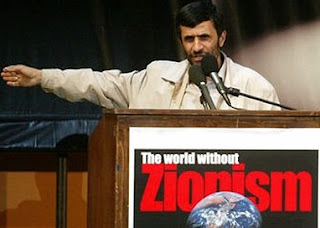 |
| Ahmedinejad delivers his infamous "Wipe Israel from the map" speech at Tehran's “The World without Zionism” Conference, October 26, 2005 |
"have called for a closed debate on President Mahmoud Ahmadinejad's apparent boycott of his official duties. The president has not been seen at his office for eight days, missing two cabinet meetings and cancelling a visit to the holy city of Qom. Iran's supreme leader, Ayatollah Khamenei, recently re-instated a cabinet minister he had pushed out. Analysts believe an internal power struggle may be under way."The timing is interesting. Ahmedinejad's Iran is closely identified with the currently-embattled Bashar Assad regime in Iranian-client Syria. The secretive Syrians are in the news because of the ruthless and increasingly bloody attempts by government forces to put down a popular rebellion. Al Arabiya says that this past Friday, Syrian troops armed with tanks and helicopters killed at least four people (BBC says 6) in and near the famous Omari mosque, located in the Roman-era old town of Deraa. (The LA Times carries a report today quoting a Syrian military source who says Assad's security forces have been ordered to quell the uprising in Deraa "even if this means that the city is to be burned down.") Ynet quotes Syrian sources saying 62 Syrians were killed in protests on Friday alone. The UK-based Syrian Observatory for Human Rights says 539 people have been killed since protests against the repressive Assad dynasty began on 15 March.
We all know the killing of worshippers in a mosque would normally make major headlines. But for reasons only a close observation of Middle East media coverage would begin to explain, the grotesqueries of the Syrians have long benefited from benign neglect by the world's media and politicians.
Also little noted, but in reality of huge significance, is that Yukiya Amano, the head of the International Atomic Energy Agency, said Thursday for the first time (quoted in an AP report) that a target in the Syrian desert the Syrians complained was attacked and destroyed by Israeli forces in 2007 was indeed the covert site of a future Syrian nuclear reactor
"countering assertions by Syria that it had no atomic secrets. Previous reports by the International Atomic Energy Agency have suggested that the structure could have been a nuclear reactor. Thursday's comments by IAEA chief were the first time the agency has said so unequivocally..."AP also notes that
"Syria denies allegations of any covert nuclear activity or interest in developing nuclear arms. Its refusal to allow IAEA inspectors new access to the bombed Al Kibar desert site past a visit three years ago has heightened suspicions that it had something to hide, along with its decision to level the destroyed structure and later build over it... The IAEA is also trying to probe several other sites for possible undeclared nuclear activities linked to the bombed target but Damascus has been uncooperative on most counts, saying that most of the sites are restricted because of their military nature... Israel has never publicly commented on the strike or even acknowledged carrying it out. The U.S. has shared intelligence with the agency that identifies the structure as a nearly completed nuclear reactor that, if finished, would have been able to produce plutonium for the fissile core of nuclear warheads."The Ahmedinejad regime's own nuclear program is also under IAEA investigation after a long history of Iranian denials, semi-admissions and outright falsehoods. The BBC says:
"Iran hid an enrichment programme for 18 years, so the Security Council says that until Iran's peaceful intentions can be fully established, it should stop enrichment and other nuclear activities... Iran's nuclear facilities remain under IAEA monitoring and the IAEA produces regular reports. However it has reported that Iran is refusing to answers questions about allegations that it has in the past studied how to make a nuclear warhead."The Undersecretary for Media Affairs at Iran's Supreme National Security Council (Abolfazl Zohrehvand to his friends) captures Iran's attitude well when quoted by an Iranian source a few days ago saying "the world has accepted Iran as a nuclear state" and that Iran's approach "is based on nuclear transparency".
With so much partial and wrong information out there, there may be individuals somewhere who believe him.

No comments:
Post a Comment